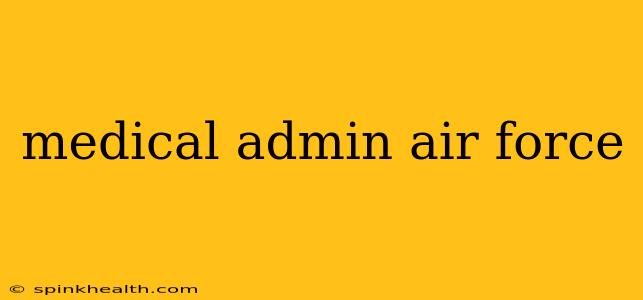A Life in Service: Exploring the World of Medical Administration in the Air Force
The crisp blue uniform, the unwavering dedication, the quiet sense of purpose – these are hallmarks of a career in the Air Force. But beyond the pilots and the mechanics, a vital network of support ensures the smooth operation of this powerful branch of the military. At the heart of this network lies medical administration, a field demanding organization, compassion, and a steadfast commitment to the well-being of others. This isn't just about paperwork; it's about ensuring the health and readiness of an entire fighting force.
My journey into this world began unexpectedly. I’d always been drawn to healthcare, but the structured environment of the military initially seemed daunting. However, the allure of serving my country, coupled with the opportunity to combine my organizational skills with my passion for helping people, proved too compelling to resist. What I discovered was a career far richer and more fulfilling than I ever imagined.
What Does a Medical Administrator in the Air Force Do?
This isn't a simple question with a simple answer. The role is multifaceted, encompassing a wide range of responsibilities that contribute directly to the health and operational readiness of Air Force personnel. Imagine the intricate choreography required to manage the medical needs of a sprawling base, or the meticulous planning necessary to deploy a medical team to a remote location. This is the daily reality for a medical administrator in the Air Force.
Specifically, responsibilities can include:
- Managing medical records: Ensuring accuracy, confidentiality, and accessibility of patient information is paramount. This involves overseeing electronic health records, processing paperwork, and adhering to strict security protocols.
- Scheduling and appointments: Coordinating appointments for patients, managing clinic schedules, and ensuring efficient utilization of medical resources are critical for smooth operations.
- Financial management: Handling budgets, processing payments, and managing the financial aspects of the medical facility contribute significantly to its operational efficiency.
- Personnel management: Supervising medical support staff, managing their schedules, and ensuring their training and development are key to a well-functioning medical team.
- Supply chain management: Maintaining adequate supplies of medications, equipment, and other necessary resources is crucial for the delivery of quality healthcare.
- Emergency preparedness: Participating in emergency response planning and execution is a vital part of ensuring readiness in times of crisis.
What are the Educational Requirements for a Medical Administrator in the Air Force?
The path to becoming a medical administrator in the Air Force is varied. Many enter with a bachelor's degree, often in healthcare administration, business administration, or a related field. However, on-the-job training and professional development opportunities are abundant within the Air Force, allowing individuals to gain valuable experience and skills throughout their career. Many positions also require specific certifications or licenses.
What are the Career Progression Opportunities Within Medical Administration in the Air Force?
The Air Force offers significant opportunities for career advancement within medical administration. With experience and continued professional development, individuals can progress to supervisory roles, leading teams and managing larger budgets. There are also opportunities to specialize in particular areas of medical administration or to pursue further education and certifications. The possibilities are as diverse as the individuals who serve.
Is Medical Administration in the Air Force a Rewarding Career?
Absolutely. The sense of purpose and contribution to something larger than oneself is profound. The opportunity to serve alongside dedicated professionals, to make a real difference in the lives of others, and to continually learn and grow are unparalleled. While the challenges are real, the rewards – both personally and professionally – are immeasurable. This isn't just a job; it's a calling. It's a chance to build a career while contributing to the well-being of others and to the strength of our nation. And that, I can tell you from personal experience, is profoundly rewarding.

